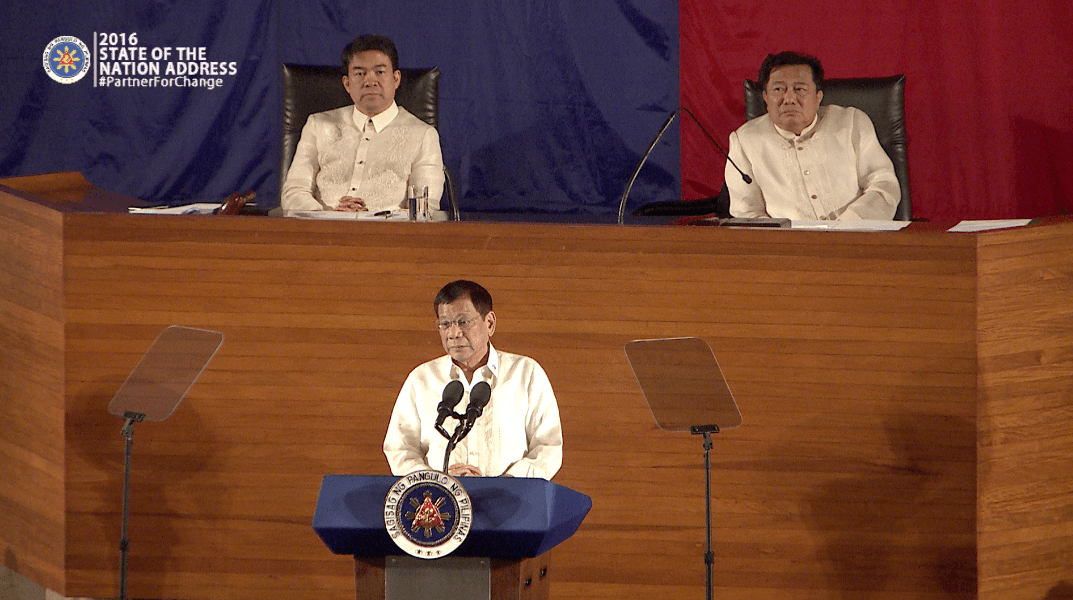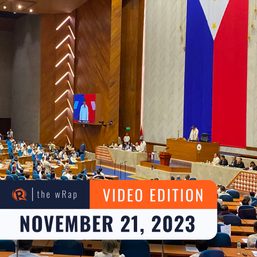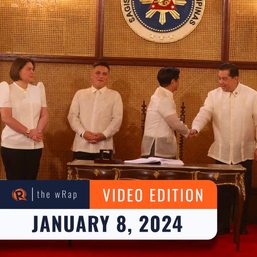SUMMARY
This is AI generated summarization, which may have errors. For context, always refer to the full article.

MANILA, Philippines – A day after President Rodrigo Duterte delivered his first State of the Nation Address (SONA), the Disaster Risk Reduction Network (DRRNet) Philippines welcomed the President’s bold pronouncements about the environment.
They also reminded Duterte to include disaster risk reduction in his priorities.
“What he said about the environment and illegal mining was good. If it will really be implemented, it’s a good contribution because open pit mining and the destruction of the environment aggravate disasters,” Maria Fellizar Cagay, lead convenor of DRRNet Philippines, said on Tuesday, July 26.
On Monday, July 25, Duterte emphasized the importance of taking care of the environment and directed the environment department to “go ahead” and “amend, suspend, or revoke” environmental permits if warranted.
During his speech, Duterte also warned industries that affect the environment to comply with government standards.
“[The Department of Environment and Natural Resources (DENR)] is likewise directed to review all permits granted to the mining, logging, and other environmental-sensitive activities. Ensure compliance with government standards and if warranted,” Duterte said.
Cagay added that Duterte’s environmental policy is important especially in a disaster-prone country like the Philippines.
A study conducted by risk analysis firm Verisk Maplecroft in 2015 revealed that 8 out of 10 disaster-prone cities in the world are located in the Philippines. Aside from the risks posed by of volcanic eruptions, earthquakes, and floods, the country is also hit by an average of 20 typhoons every year.
Disaster risk reduction
While Duterte’s pronouncements are important in reducing disaster risks, DRRNet enumerated the actions the current administration can undertake in its first 100 days to protect the vulnerable and build more resilient communities.
Aimed at guiding the administration in its action plan for the environment, DRRNEt launched its 911 campaign: 9 calls, 1 agenda, 1 resilient Philippines.
“The first 100 days campaign is our effort to bring together various issues and agenda related to building resilient communities under this administration. It aims to monitor the administration’s pronouncements and actions on a range of issues we think are important in addressing the key drivers of poverty and vulnerability in our country,” Oxfam coordinator Marie Grace Madamba-Nuñez said.
Oxfam and ther environmental groups under DRRNet like Balay Rehabilitation Center, Buklod Tao, and Citizens’ Disaster Response Center made the following recommendations to the President.
-
Certify as urgent the passage of an amendatory bill to Republic Act 10121 that will establish an independent National Disaster Risk Reduction and Management Authority.
-
Certify as urgent the passage of a comprehensive legislation that will protect and promote the rights of internally displaced persons (IDPs), especially in disaster and conflict-affected areas.
-
Direct the National Economic Development Authority (NEDA) to immediately take action on Yolanda reconstruction and recovery issues and fast track implementation of reconstruction programmes in Yolanda–affected areas particularly on resilient human settlements.
-
Direct the National Disaster Risk Reduction and Management Council (NDRRMC) and Department of Budget and Management (DBM) to issue a clear policy guideline on the proactive use of the National DRRM Fund particularly for high risk and low-income LGUs.
-
Direct the Department of Interior and Local Government (DILG) to intensify inclusive capacity building programs and ensure that Local DRRM Offices are functional and permanent DRRM Officers are in place.
-
Direct the NDRRMC to create a program supporting the establishment of safe, resilient, and multi-purpose evacuation centers, prioritizing high-risk and vulnerable areas.
-
Direct the NDRRMC to issue a clear policy guideline to ensure inclusive participation and representation of CSOs at the local level.
-
Direct the NDRRMC to develop a Magna Carta for DRRM Workers and volunteers.
-
Direct the NDRRMC to ensure accountability of public officials as stipulated in Republic Act 10121.
DRRNet vowed to continue engaging the government to ensure that disaster risk reduction and climate change adaptation are included in the priority agenda of both the legislative and executive branches of the government. – Rappler.com
Add a comment
How does this make you feel?















There are no comments yet. Add your comment to start the conversation.